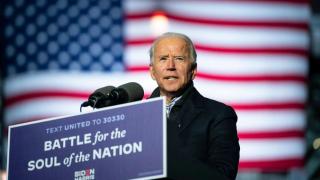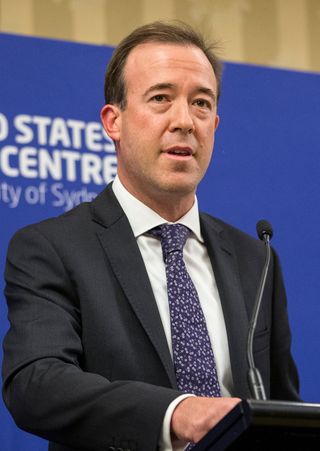Since Joe Biden’s US election win, a wave of relief has washed over the foreign policy commentariat. The storyline appears set: with adults back in the room, Washington will relight multilateralism’s torch while displaying a surer touch on alliance management and strategic competition with China.
Biden’s own rhetoric has calmed nerves frazzled by four years of Donald Trump’s meandering idiosyncrasy. "America is back", he says, and "ready to lead the world".
A slew of appointments from the Obama presidency, as the Financial Times’ Ed Luce observes, implies "the resumption of business as usual", almost the return of an ancien regime.
While aspects of Trump’s legacy will be reversed by the stroke of a pen, the real challenge remains to rebuild trust in the United States’ world role among the American middle class.
But this is not the conversation we need to be having on American foreign policy. While aspects of Trump’s legacy will be reversed by the stroke of a pen, the real challenge remains to rebuild trust in the United States’ world role among the American middle class.
That job falls to national security adviser-designate Jake Sullivan, who also worked for Biden as vice-president and on Hillary Clinton’s campaign in 2016. Among other Democrat thinkers he has spent the past four years wrestling with how best to respond to the forces Trump rode to power: that swirling, free-floating mass of anxiety, stress and bitterness in America's heartlands.
In a series of articles and reports since 2017 in the Journal of Democracy and The Atlantic, Sullivan has sought to define a new vision of American exceptionalism, one which puts aside ambition abroad to focus squarely on responding to domestic social and economic dislocation.
His prescription is that today’s "new old Democrats" take from Franklin Roosevelt’s fight against economic depression and Lyndon Johnson’s war on poverty the inspirational impulse to rescue and rebuild the middle class. Its "hollowing out", he writes, "has sapped our national vitality and eaten away at our national unity". It starts with defining what counts as America’s "economic interest, looking beyond generic GDP growth to understand the impact of specific policies on corporations and communities".
Just before the election, Sullivan and colleagues at the Carnegie Endowment for International Peace released a major report setting out the problem.
Based on interviews in Nebraska, Ohio and Colorado with a wide range of small business owners, farmers, labour representatives, officials and educators, it attempts to understand the view of US foreign policy from their perspective. It recognises that the middle class is by no means monolithic and is split along class, gender, ethnic, racial and geographical lines; the three states were chosen for their industrial and political mix: a "good proxy for many of the national-level debates now playing out at the intersection of US foreign policy and middle-class wellbeing".
Sharp repudiation
Sullivan knows this adds up to much more than making international trade policy work better for manufacturing workers. Indeed, the conclusion is that many American middle-class jobs in the 21st century "may be found online, not on the assembly line".
The report is unsparing not only in its critique of Trump’s "America First" policies in alleviating middle-class stress but in its rejection of a return to the status quo ante. Its assessment of Trump "doesn’t necessarily amount to a full-throated defence of all that came" before him. Indeed, it is a sharp repudiation of the over-extension of American foreign policy from the end of the Cold War to Barack Obama.
The authors concede that too many of their predecessors in the establishment "did not fully appreciate the distributional impact of the increasingly interconnected global economy".
Allies that spent the past four years congratulating themselves on managing Trump, or pandering to his instincts will now face a far different reckoning: how they remain relevant to America reconstruction.
Accordingly, they want to banish stale organising principles, doctrines and grand strategies. On China, for example, the report finds "no evidence America’s middle class will rally behind efforts aimed at restoring US primacy in a unipolar world, escalating a new cold war with China, or waging a cosmic struggle between the world’s democracies and authoritarian governments".
Allies, too, will have to think harder about where they fit into this narrative. If the report proves influential – and there is every reason to think it will – then US allies, as well as being asked to do more, will need to be mindful that Washington’s agenda will be motivated primarily by the needs of American middle-class households.
Nevertheless, neither Sullivan nor his co-authors can bring themselves to break with American exceptionalism entirely. They advocate no retrenchment, no abandonment of a values-based world view. They cannot conceive of America as a "normal" country. They know that defence spending and the defence industrial base will remain the "lifeblood" for many middle-class communities across the US. Likewise, they recommend the funding of "healthy military budgets to blunt China’s destabilising incursions in the Asia-Pacific region".
All that will reassure allies in Asia. But they also will not miss the report’s other recommendation for a prudent reduction in defence spending "gradually and predictably over the longer term".
At the core of this report, though unstated, is a painful admission that over the past quarter-century American national mythology has lost some of its virtue.
Sullivan is adamant that virtue can be restored, but he knows the answer lies primarily at home. This will be a long-haul project with no guarantee of success. It will absorb much of the Biden administration’s policy energy and is being attempted against the backdrop of toxic political polarisation.
Allies that spent the past four years congratulating themselves on managing Trump, or pandering to his instincts will now face a far different reckoning: how they remain relevant to America reconstruction.






